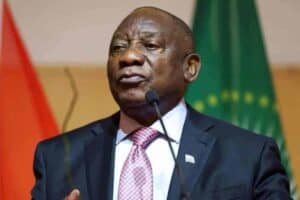Indications are that in both Free State and North West ANC, the monopolistic power of the Zuma faction has been broken.

Far from toppling President Cyril Ramaphosa, the recent unsuccessful insurrection in KwaZulu-Natal and parts of Gauteng may have strengthened his hand within the ANC as his battle-scarred loyalists closed ranks around him.
Unlike their vocal opponents in the ANC faction loyal to Jacob Zuma and Ace Magashule, the Ramaphosa coterie has spoken little and avoided public displays, but has been fighting a determined, clean, fight silently behind the scenes to defend their man.
Political analyst Professor Mcebisi Ndletyana said Ramaphosa was on course to fully control the party.
Ndletyana said since the Nasrec elective conference of 2017, Ramaphosa has been able to consolidate his power because he had strong, although perhaps not readily evident, backing, which enabled him to have authority over both the party and state.
Ramaphosa, a man of peace who preferred dialogue and following processes over confrontation, has two pillars of support. He relies heavily on “born-again” former Zuma supporters on one hand and a group of hardened party activists who believe in the ANC’s original principles of ethical leadership and selflessness, on the other.
While they are still to dominate completely, they have scored telling victories, including enforcing the step-aside rule, which saw the suspension of Magashule from his post as secretary-general.
The Zuma supporters who changed sides include ANC national chairperson Gwede Mantashe and party national executive committee members Fikile Mbalula, Zizi Kodwa, Blade Nzimande and Bheki Cele, with a strong anti-Zuma sniper in Pravin Gordhan.
They stood in with front-row stalwarts such as Joel Netshitenzhe, Derek Hanekom, ANC subcommittee on economic development head Enoch Godongwana and Ronald Lamola.
Ramaphosa brought Cele and Senzo Mchunu closer to him as a step towards influencing KwaZulu-Natal. His attempt to win over elusive KwaZulu-Natal premier Sihle Zikalala hit a wall due to the divided loyalities of the KZN ANC provincial executive committee.
In the recent failed insurrection and mayhem reportedly aimed to topple Ramaphosa, the front men stood back to allow the second layer of his army attack.
Those who defended the president were Gauteng premier David Makhura, State Security Deputy Minister and ANC NEC member Kodwa, Defence and Veterans Deputy Minister Thabang Makwetla and Minister in the Presidency Khumbudzo Ntshavheni.
The second layer also had the provincial premiers Zamani Saul of Northern Cape, Oscar Mabuyane of Eastern Cape, Stan Mathabatha (Limpopo) and Job Mokgoro (North West).
Magashule’s home province Free State and North West, the home turf to the charismatic Supra Mahumapelo, were neutralised with the imposition of an inclusive interim provincial committee comprising members from both sides.
Ndletyana said events were in favour of Ramaphosa and his camp.
“Everyone is rallying behind the rule of law. There is outrage within the ANC and outside that the corruption was damaging the country and the ANC,” he said.
Ndletyana said Ramaphosa was not “imposing” this on individuals, but rather reflecting the mood of the people “because the country wants him to act”.
Indications are that in both Free State and North West ANC, the monopolistic power of the Zuma faction has been broken.
Other former Zuma loyalists now safely in Ramaphosa’s fold are Naledi Pandor, Basic Education Minister Angie Motshekga and her husband, Dr Mathole Motshekga.
The silent loyalists are said to be Communications Minister Stella Ndabeni Abrahams, and Acting Health Minister Mmamoloko Kubayi-Ngubane.
Those whose loyalties remain a mystery are Lindiwe Zulu of social development and former president Thabo Mbeki’s Cabinet ministers Thoko Didiza and Nosiviwe Mapisa-Nqakula (defence minister).
State Security Minister Ayanda Dlodlo’s membership of Umkhonto we Sizwe Military Veteran’s Association placed her as Ramaphosa’s virtual opponent, but Human Settlements Minister Lindiwe Sisulu has been openly opposed to the president.
Nkosazana Dlamini-Zuma is said to still be untrusted within the Ramaphosa camp.
“The mandate Ramaphosa received from the ANC should be used to stamp his authority on his Cabinet ministers to deliver the goods, not give them autonomy,” said Ndletyana.
“He must speed up reforms in departments such as state security because it’s clear there is a problem there.”






